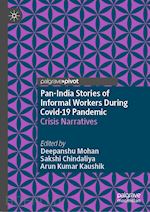
Questo prodotto usufruisce delle SPEDIZIONI GRATIS
selezionando l'opzione Corriere Veloce in fase di ordine.
Pagabile anche con Carta della cultura giovani e del merito, 18App Bonus Cultura e Carta del Docente
This book aims to delve into the application of feminist ethnography by engaging with the lived experiences of vulnerable workers, occupied by India’s informal workforce, across its deeply stratified labour-market landscape.
Set up and organized in a diverse spatial trajectory through identified case studies from across India, the book, in a post pandemic context, aims to study, critically reflect on the vulnerable state of India’s workforce, capturing the daily emergencies, livelihood of marginalized communities. Case studies in the book feature the pandemic-crisis narratives of farmers, fisherfolk, factory workers, artisans, small scale entertainment providers, sanitation, and waste workers, to name a few.
By understanding the intersectional dimensions of social structures like caste, gender, and class our case studies in the book also attempt to unpack the ‘dualities’ present in the contemporary understanding of India’s labour market. Reflective discussions with field ethnographers through first-person narratives help documenting their own observations from different case studies, while focusing on interactions on how to work through power dynamics and varied positionalities across dynamic field sites marked with different spatial characteristics.
The text is primarily aimed at students and peer scholars of development studies, or for those who interested in learning about the application of ethnographic methods to studying/understanding the governing dynamics of informality across India and South Asia.
Chapter 1: Introduction.- Chapter 2: Methodology: (Feminist) Ethnography in Crisis.- Chapter 3: Navigating Through Shocks: Mi?avar of Tamil Nadu and Pondicherry.- Chapter 4: Flooding Urbanity: Narratives from Safai Karamcharis of Guwahati, Assam.- Chapter 5: Living Among Waste: Bachaikaris of Bhalswa.- Chapter 6: Cycle of Poverty: Analysing the Social Structures of the Women of Kapashera.- Chapter 7: Reflections.
Deepanshu Mohan is Professor of Economics and Director, Centre for New Economics Studies, Jindal School of Liberal Arts and Humanities, O.P. Jindal Global University. He is a Saw Swee Hock Southeast Asia Centre Visiting Professor at the London School of Economics and Political Science, and an Honorary Research Fellow with Birkbeck College, University of London.
Sakshi Chindaliya is an Assistant Lecturer and Programme Coordinator for the Jindal Fellowship Program at Jindal School of Liberal Arts and Humanities, O.P. Jindal Global University. She is also a Senior Researcher at the Centre for New Economics Studies. As a feminist geographer, she is interested in gender and sexuality studies, international development, and ethnographies of water and disasters.
Arun Kumar Kaushik is an economist by training with background in business economics, law and economics and development economics. He co-authoreda book on Indian Elections, "Who Moved My Vote? His other research interests are intellectual property law and its dynamics and distortions.











Il sito utilizza cookie ed altri strumenti di tracciamento che raccolgono informazioni dal dispositivo dell’utente. Oltre ai cookie tecnici ed analitici aggregati, strettamente necessari per il funzionamento di questo sito web, previo consenso dell’utente possono essere installati cookie di profilazione e marketing e cookie dei social media. Cliccando su “Accetto tutti i cookie” saranno attivate tutte le categorie di cookie. Per accettare solo deterninate categorie di cookie, cliccare invece su “Impostazioni cookie”. Chiudendo il banner o continuando a navigare saranno installati solo cookie tecnici. Per maggiori dettagli, consultare la Cookie Policy.